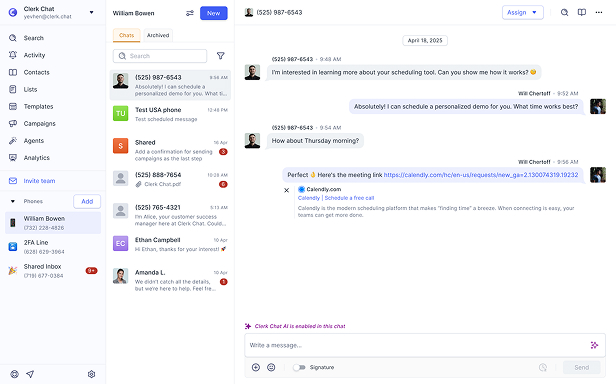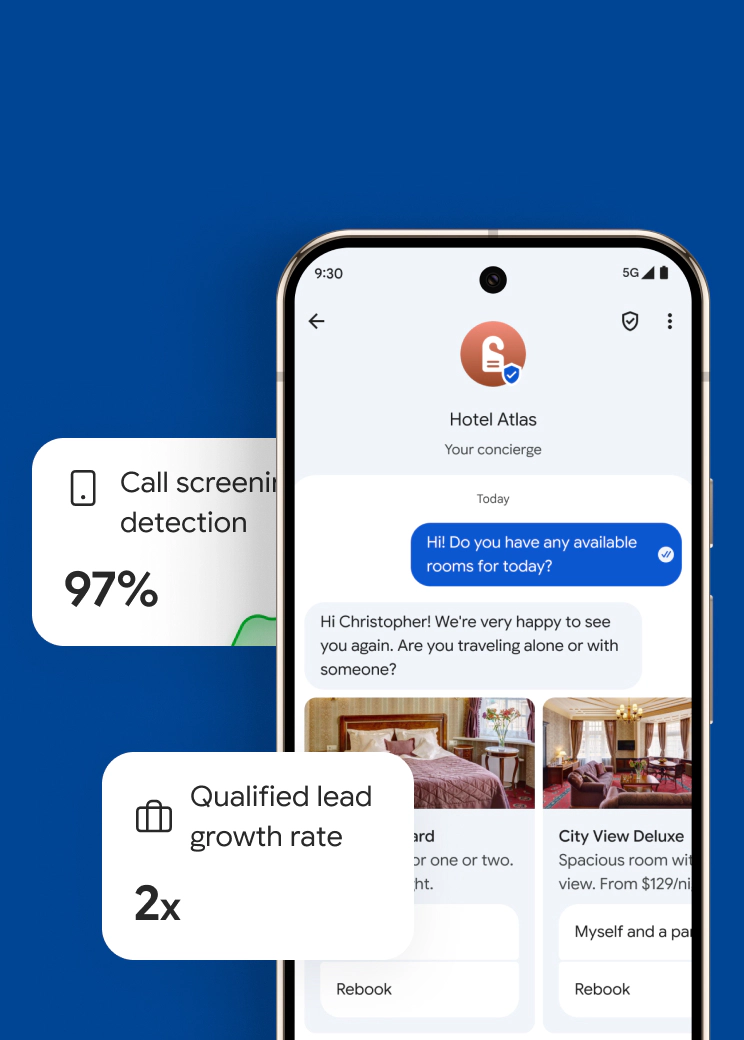Agentic AI for Retail: Engage. Convert. Repeat.
By William Bowen
- Published: July 23, 2025
Key points in this article:
- Agentic AI is quickly becoming one of the most valuable tools for retailers, helping organizations automate more tasks, enhance customer service, and increase conversion rates.
- Unlike traditional AI systems, agentic AI can proactively plan, make decisions, and take actions toward business goals with minimal human intervention.
- In the retail industry, companies use agentic AI to deliver more personalized experiences across channels, enhance customer service and support, increase engagement and sales, and boost revenue with dynamic pricing.
- Agentic AI helps retail companies cut operational costs and improve efficiency by optimizing inventory and supply chain management tasks.
- As agentic AI solutions evolve with multimodal capabilities, more advanced language models, and AI-to-AI collaboration solutions, their value for retail companies will skyrocket.
If you’re not already investing in agentic AI for retail transformation, now could be the perfect time to start building your strategy. Agentic AI isn’t just the latest buzzword among companies exploring intelligent applications and tools—it’s a transformative force.
Unlike traditional AI models that primarily just “react” to user input (like prompts and questions), agentic AI solutions empower companies to create truly autonomous agents that can plan, act, and even adapt to dynamic situations with minimal human input.
In retail, agentic AI tools are revolutionizing customer service across channels. They’re helping companies to boost customer engagement levels (and increase sales) proactively. They’re even helping to optimize supply chains, reduce operational costs, enhance inventory management, and drive better business decision-making.
Here, we’ll explore everything you need to know about the potential of agentic AI in the retail industry, examine the challenges this technology can help you overcome, and share our insights into the top trends that will shape the future of intelligent retail.
In this article:
Decoding Agentic AI in the Retail Industry
Before we cover some of the major benefits of agentic AI technologies for retail companies, it’s worth defining what “agentic AI” actually is—and how it differs from traditional AI tools.
Agentic AI solutions are AI systems that can plan, make decisions, and take actions towards specific goals with minimal human intervention.
Although some agentic AI systems leverage generative AI, conversational AI, and predictive AI algorithms, there’s a big difference between something like a conversational commerce chatbot, and an agentic AI solution.
As we note in our agentic AI vs conversational AI guide, most business AI tools, including cutting-edge intelligent chatbots, are “reactive.” They respond to user input. For instance, a retailer might use an automated texting service with an integrated AI bot that can answer common questions about order histories, return policies, and opening times.
Agentic AI tools are more “proactive”. They collect and interpret data from various sources (such as point-of-sale systems and CRM tools). They then develop and act on action plans that help businesses achieve specific goals. For instance, in the customer service landscape, a generative AI tool or conversational bot could answer a customer query about a return.
An agentic AI system, on the other hand, could walk a customer through the process of submitting that return, notify logistics teams, update inventory details, and even follow up with the customer at a later date.
Missing revenue because your team can’t follow up fast enough? Agentic AI’s already on it.
Try Clerk ChatThe Retail Landscape: Challenges Demanding Innovation
So, what makes agentic AI for retail so compelling right now? The simple answer is that retail companies are facing a range of complex challenges.
Customers’ expectations are evolving, with 71% of buyers now saying that they expect high levels of personalization, as well as faster, omnichannel support.
But they also care about privacy. With increasing awareness of data collection, particularly under regulations such as GDPR and CCPA, retailers are under pressure to strike the right balance. Get it wrong, and you risk losing customer trust.
Even if companies manage to collect all of the data they need to deliver personalized customer service, delivering “consistency” across channels can be extremely difficult. Sales, marketing, and customer service teams consistently struggle with growing gaps that often result in fragmented and repetitive customer interactions.
On top of that, managing operations in the retail sector is far from simple. Margins are tighter than ever, thanks to rising labor costs, supply chain disruptions, and inflation. Plus, navigating inventory and fulfillment processes has become a nightmare for many brands in recent years, leading to inefficiencies and disruptions that hamper growth.
While companies need more than just the latest AI tools to overcome all of these hurdles, agentic AI has the potential to minimize issues with scalable, automated solutions that reduce friction and improve outcomes across the board.
The Benefits of Agentic AI for Retail Brands
Retail isn’t just about transactions anymore. Companies that want to stay ahead in an increasingly complex landscape need the right tools to help them build faster, smarter, and more personalized experiences for their audience.
That’s where agentic AI for retail companies really shines. This technology is helping to optimize everything from omnichannel customer service to proactive outreach strategies and even supply chain management.
Here’s a closer look at how agentic AI tools can address the biggest challenges facing retail brands today.
Enabling Hyper-Personalization (without Compromising Privacy)
Consumers want tailored experiences but are also concerned about how their data is collected and used. Agentic AI helps companies find the sweet spot between personalization and privacy, while adhering to evolving compliance rules.
Instead of relying on static segments or cookie-based tracking, autonomous agents dynamically process behavioral, contextual, and transactional data in real time to personalize product recommendations, content, and offers. They can do all that while adhering to strict company guardrails, ensuring minimal issues with data leaks, SMS compliance problems, and so on.
For example, Sephora is currently reimaging customer experiences with AI agents that can curate personalized product bundles and offers for customers based on their browsing history and skin profiles. Unlike earlier recommender engines, these agents adapt in real-time based on customer feedback and product performance.
Agentic AI solutions can also leverage integrations with CRM platforms and other tools to dynamically update customer preferences in real-time, ensuring companies can adapt quickly to changing data storage preferences and evolving privacy regulations.
Optimizing Customer Service and Support
If you’ve explored the benefits of conversational AI in retail, you probably already know how effective intelligent tools are at improving the “customer service” experience. AI solutions enable companies to deliver 24/7 support to customers across multiple channels in various languages.
However, while standard conversational AI in ecommerce is fantastic for automating typical customer support tasks (like answering common questions), agentic AI for retail introduces new opportunities to deliver more proactive, intuitive service.
Agentic AI systems can remember past issues, track orders, and even resolve multi-step problems without human intervention. They can even complete simple tasks, like issuing a refund request to a team or proactively contacting customers with up-to-date information about an order or delivery.
For instance, imagine a customer contacts your support team asking about a late package. A generative AI chatbot might provide a canned response. But agentic AI in customer experience tools can look up the order, identify the shipping delay, file a support ticket, offer a refund or coupon, and message the customer with a personalized update—all autonomously.


Improving Engagement and Increasing Sales
Keeping customers engaged is tricky in today’s competitive retail environment. Buyers don’t just want responsive companies that answer their questions quickly. They’re prioritizing brands that proactively reach out and keep them informed about new product launches, emerging sales, and relevant offers.
Agentic AI for retail allows businesses to proactively engage customers across various channels, from SMS to OTT messaging apps. For instance, built into an AI SMS platform, an agentic AI system can initiate timely, relevant messages across SMS, WhatsApp, and other platforms based on customer behavior.
For example, if someone abandons a cart, the AI can automatically send a personalized reminder via text, include a discount code, and answer follow-up questions, all in the same thread.
If a customer regularly purchases a specific type of product, the agentic tool can automatically notify them when that product goes on sale or when a new option becomes available. This boosts customer satisfaction rates and gives you more opportunities to increase sales and conversions.
Boosting Revenue with Dynamic Pricing
Pricing is one of the trickiest things for any retail company to master. These days, you can’t just set a price for your products based on what the competitors are offering and hope for the best. You need to respond to changes in market demand and trends dynamically.
Unfortunately, developing a dynamic pricing strategy isn’t easy, particularly when you sell hundreds or thousands of products.
With agentic AI in the retail industry, companies can create intelligent assistants that automatically monitor thousands of data points and adjust prices to boost profit margins or clear inventory. These tools can even test multiple strategies across different regions, product lines, or customer types, learning what works and refining them over time.
Plus, if your agentic AI tool is integrated with your retail SMS platform and CRM system, your bots can keep customers informed as prices change. For instance, with a Salesforce texting integration, your agentic tools can automatically identify the customers most likely to be interested in a notification about a price update, and autonomously manage outreach.
Creating Smarter Supply Chains
As mentioned above, today’s retail supply chains are under constant pressure. Business leaders have to quickly adapt to supplier delays, demand swings, and more. Agentic AI can help here too—guiding teams towards more effective strategies.
Let’s say there’s a sudden spike in demand for an item. Instead of waiting for human input, the AI agent checks warehouse levels, reorders stock, and reroutes logistics to meet demand. Or if a key supplier reports a delay, the agent can proactively adjust lead times, notify affected stores, and find alternatives.
Agentic AI solutions can manage communications with logistics and fulfillment suppliers too, using a Shopify SMS integration or similar tool to automatically connect with suppliers when inventory levels run low.
Powering Smarter Growth Decisions
Another major benefit of agentic AI for retail is that it can empower companies to make smarter decisions for growth. Agentic AI solutions can connect with all your business platforms, from SMS and RCS marketing solutions to your CRM platform and inventory management apps, helping you identify opportunities.
For instance, an agentic AI tool could analyze the impact of your marketing strategies across platforms and suggest ways to boost your return on investment by focusing on specific channels or utilizing more advanced audience segmentation techniques.
The same tools can analyze your customer service strategies, customer feedback, and retention rates, and introduce you to ways of minimizing customer churn or unlocking higher levels of customer loyalty.
Some companies in the retail sector are even using AI tools to help with forecasting demand and future customer needs, helping them to develop more intelligent staffing strategies and adapt quickly to seasonal trends.
Missing revenue because your team can’t follow up fast enough? Agentic AI’s already on it.
Try Clerk ChatExamples of Agentic AI in Retail
Forward-thinking retailers aren’t just talking about the benefits of AI in customer service, sales, and marketing tasks. They’re actively exploring new ways to use cutting-edge tools to boost conversions and sales, reduce customer service friction points, and address challenges. Here’s a quick look at how some of the top companies are leveraging agentic AI in retail today:
Nova Auto Pros + Clerk Chat
Nova Auto Pros, an innovative auto parts retailer, turned to Clerk Chat to modernize its customer communication. Using Clerk Chat’s AI-powered business texting solutions, the company built custom agents capable of responding to customer queries, validating and qualifying leads, and automating follow-up tasks.
With agentic AI for retail, Nova Auto Pros hasn’t just streamlined repetitive customer service and sales tasks—it has significantly improved its conversion rates. Nova Auto Pros now benefits from 25% more qualified leads and 60% higher conversion rates overall.
Amazon’s Shopping Agents
As one of the world’s leading retailers, Amazon is no stranger to the benefits of AI tools for customer service. The company recently updated its ecommerce chatbots, with shopping agents that can help customers find the right products, compare options, and complete transactions, all without human intervention.
Amazon also uses agentic AI to help with inventory management, supply chain optimization, and demand forecasting. It uses various intelligent tools to make quicker, more informed decisions that help to keep it one step ahead of the competitors in the retail market.
Decathlon and AI-Powered Customer Engagement
Sporting goods giant Decathlon is another innovator tapping into the benefits of agentic AI for retail brands. This company has deployed a team of AI tools designed to manage post-sale support across popular channels like WhatsApp and web chat.
Their AI agents resolve over 50% of service tickets without human input, handling returns, FAQs, and order issues automatically. This has cut their average resolution time by 40% and increased customer satisfaction rates significantly.
The Future of Agentic AI in the Retail Industry
While there are already plenty of examples of companies using agentic AI to revolutionize retail, it’s worth noting that we’re still in the early stages of exploring what this technology can truly do. Moving forward, as AI tools become more sophisticated and accessible, we’ll undoubtedly see additional information in the retail space.
Just a few trends worth paying attention to right now include:
The Rise of Advanced Language Models: New iterations of models like GPT-4 and beyond are improving rapidly. These models understand more complex instructions, carry context over longer conversations, and generate more accurate, human-like outputs. For retailers, that means AI agents will soon be able to handle even more nuanced customer interactions, from high-stakes complaints to personalized shopping advice.
Multimodal AI Capabilities: The next wave of agentic AI will go beyond text. Multimodal agents will process and act on visual, audio, and even video inputs. For example, a customer could send a photo of a broken item, and the AI could identify the product, check warranty status, initiate a return, and follow up via RCS business messaging tools.
AI-to-AI Collaboration: In the near future, retailers will see AI agents working together across departments. One agent might handle customer service, another manages inventory, and a third deals with comprehensive SMS marketing strategies. This type of AI-to-AI interaction will enable real-time optimization across the entire retail operation.
All of this innovation means that agentic AI for retail will soon evolve from a helpful solution for cutting-edge companies into a fully-fledged solution for augmenting and enhancing all kinds of retail practices.
Agentic AI for Retail: The ROI of Autonomy
The potential of agentic AI for retail companies is astronomical. Whether you’re looking for a way to automate complex, repetitive tasks, you want to turbocharge SMS marketing for eCommerce growth, or you’re trying to enhance customer experiences, agentic AI is an incredible solution.
Agentic AI tools are already making retailers more efficient and productive. They’re reducing costs, minimizing supply chain issues, and boosting customer engagement, conversion, and retention rates. Agentic AI systems are even helping retail companies differentiate themselves in an increasingly competitive market.
In a world where customers expect speed, personalization, and convenience, agentic AI in the retail industry is becoming a must-have. Fortunately, platforms like Clerk Chat make it easy for retailers of all sizes to tap into the benefits that agentic AI has to offer.
With Clerk Chat, any company can easily build connected AI agents that can deliver 24/7 customer support, proactively engage customers, and nurture leads.
Ready to discover what agentic AI can do for your retail brand? Contact Clerk Chat today.
Will’s latest superpower is building innovative AI solutions to add value for clients. He's passionate about all things AI, entrepreneurship, and enjoys staying active with sports and outdoor activities.
In this article:
Ready to use your business number for text messaging?
Thousands of businesses are already experiencing the power of conversational messaging through SMS. Join us. Free trial and paid tiers available.
Get Started#Subscribe
Get product updates in your inbox
Tutorials, features, and Clerk Chat news delivered straight to you.




